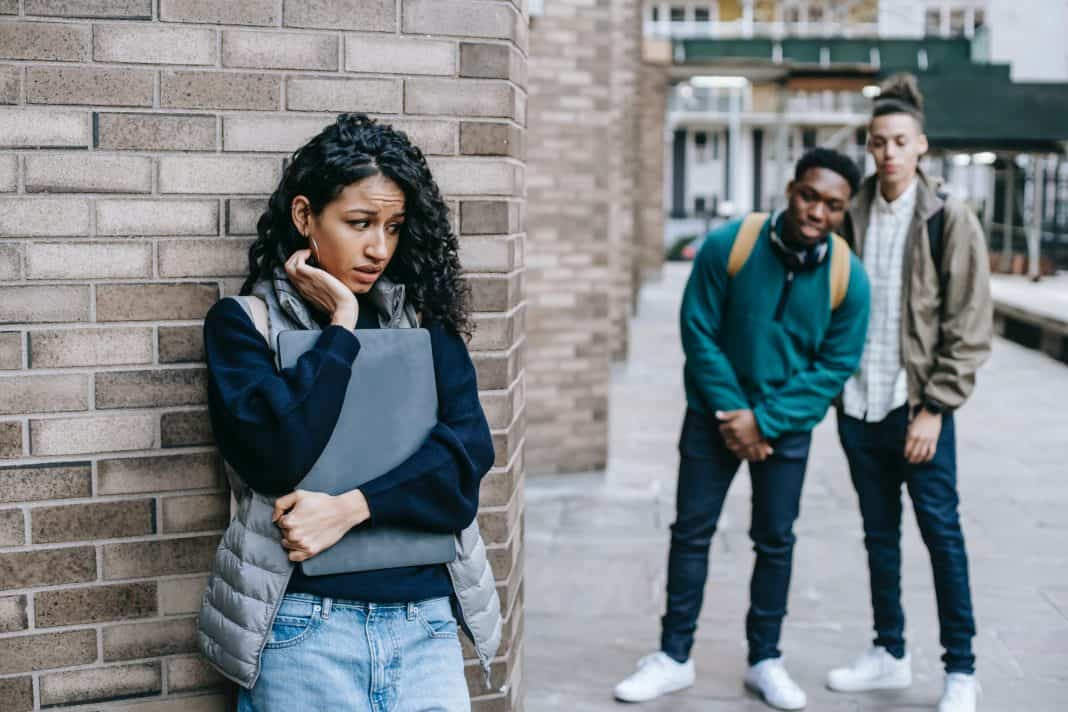This summer, after endless bullying from her peers, 15-year-old Sadie Riggs took her own life. She had experienced bullying in school, but it was social media that made it so difficult for her to escape the torment, according to NBC. Classmates were seeking her out, sending cruel messages through multiple social media platforms and messaging apps, encouraging her to end her own life. The cyberbullying became so intense that her aunt, with whom she lived, went to the school and even reached out to Instagram, hoping someone would make the bullying stop. In June, she took Sadie’s phone and broke it, hoping to keep her from experiencing any more hate. Tragically, it seems that Sadie had already reached her limit, as she took her life less than a week later. Teens are spending more time online than ever before. The average teenager between the ages of 13 and 18 spends an average of six and a half hours a day online, according to research by Common Sense Media. Unfortunately for many children, all of this time spent online isn’t healthy.
Social Media’s Impact on Empathy
Heavy social media use has an alarming impact on how children think and feel about one another. For starters, we know that social media is designed in a way that makes it incredibly easily to get hooked.  “There are behaviorists that work alongside programmers in the industry to develop the apps and the platforms [to make them] highly, highly addictive,” says therapist Lisa Strohman, JD, PhD, and founder and director of the Technology Wellness Center and Digital Citizen Academy. From the start, parents should understand that their children and teens will feel compelled to use social media excessively. And the more they use social media, the more their behaviors—particularly their senses of empathyx—will be impacted. Because technology provides a perceived distance between individuals, it actually decreases the empathy experienced, according to research in the Journal of Psychosocial Research on Cyberspace. Empathy plays a role in inhibiting aggressive behavior. Additionally, being online provides the perception of anonymity. These two things are believed to contribute to increased levels of aggression online.
“There are behaviorists that work alongside programmers in the industry to develop the apps and the platforms [to make them] highly, highly addictive,” says therapist Lisa Strohman, JD, PhD, and founder and director of the Technology Wellness Center and Digital Citizen Academy. From the start, parents should understand that their children and teens will feel compelled to use social media excessively. And the more they use social media, the more their behaviors—particularly their senses of empathyx—will be impacted. Because technology provides a perceived distance between individuals, it actually decreases the empathy experienced, according to research in the Journal of Psychosocial Research on Cyberspace. Empathy plays a role in inhibiting aggressive behavior. Additionally, being online provides the perception of anonymity. These two things are believed to contribute to increased levels of aggression online.  “So when you’re dealing with social media, if you don’t do a preventative training or education with your kids to let them know what it is that they can expect, which is kind of this negative, hostile, aggressive behavior from other kids,” Strohman says, “then a lot of times, kids get sucked into that world.”
“So when you’re dealing with social media, if you don’t do a preventative training or education with your kids to let them know what it is that they can expect, which is kind of this negative, hostile, aggressive behavior from other kids,” Strohman says, “then a lot of times, kids get sucked into that world.”
Social Media, Cyberbullying, and Depression
It makes sense, then, that so many teens report having experienced cyberbullying. According to the Cyberbullying Research Center, in 2016, over 33 percent of middle and high school students said that they’ve been cyberbullied, and 11.5 percent admitted to cyberbullying others.  Alarmingly, only a little over 10 percent of parents are aware of just how prevalent cyberbullying is, and most teens admit they would never tell their parents if they were being bullied online. Instead, our culture has embraced limitless access to smartphones from a very young age, giving children privacy and autonomy in an online world where boundaries don’t exist unless created by parents. The average age for a child to get a smart phone is 10, with 39 percent of kids creating a social media account around age 11 and 11 percent creating one before age 10.
Alarmingly, only a little over 10 percent of parents are aware of just how prevalent cyberbullying is, and most teens admit they would never tell their parents if they were being bullied online. Instead, our culture has embraced limitless access to smartphones from a very young age, giving children privacy and autonomy in an online world where boundaries don’t exist unless created by parents. The average age for a child to get a smart phone is 10, with 39 percent of kids creating a social media account around age 11 and 11 percent creating one before age 10.  At the same time, the rate of teens taking their own lives has risen significantly in the United States since 2007, according to the Centers for Disease Control and Prevention. While many factors are at play, one belief is that social media has played a role in this tragic uptick of depression and self-harm in teens, according to an NBC News interview with CDC expert Thomas Simon. Excessive exposure to the online world seems to be impacting children and teens in two ways. First, we know that all social media users, even adults, have tend to filter what they post online to put out the best version of themselves and their life, but we’re generally not great at acknowledging that what we see online isn’t always accurate or true.
At the same time, the rate of teens taking their own lives has risen significantly in the United States since 2007, according to the Centers for Disease Control and Prevention. While many factors are at play, one belief is that social media has played a role in this tragic uptick of depression and self-harm in teens, according to an NBC News interview with CDC expert Thomas Simon. Excessive exposure to the online world seems to be impacting children and teens in two ways. First, we know that all social media users, even adults, have tend to filter what they post online to put out the best version of themselves and their life, but we’re generally not great at acknowledging that what we see online isn’t always accurate or true.  “Teenagers know that what they see on social media are idealized versions of their friends’ lives, but it still makes them feel bad about their own,” explains family and marriage therapist Amy McManus. “Teenagers, whose brains are wired for connection to their peers during adolescence, are driven to social media by FOMO—fear of missing out. Consequently, they spend more time on social media and less time actually engaging in social activities than previous generations. Ironically, this leads to isolation and depressed mood.” Secondly, since social media use lowers empathy and increases aggression in teens, it is the perfect environment for cyberbullying. And, for the victims of bullying, it doesn’t let up when they leave school and head home. In Riggs’ case, her bullies went out of their way to attack her on multiple social media platforms after school hours.
“Teenagers know that what they see on social media are idealized versions of their friends’ lives, but it still makes them feel bad about their own,” explains family and marriage therapist Amy McManus. “Teenagers, whose brains are wired for connection to their peers during adolescence, are driven to social media by FOMO—fear of missing out. Consequently, they spend more time on social media and less time actually engaging in social activities than previous generations. Ironically, this leads to isolation and depressed mood.” Secondly, since social media use lowers empathy and increases aggression in teens, it is the perfect environment for cyberbullying. And, for the victims of bullying, it doesn’t let up when they leave school and head home. In Riggs’ case, her bullies went out of their way to attack her on multiple social media platforms after school hours.  “Teenage brains are not yet fully capable of restraining impulsive behavior, and unlimited anonymous opportunity is more temptation than many of them can handle,” says McManus. “I have to imagine that many of the kids who engage in anonymous bullying online would never bully someone in real life.”
“Teenage brains are not yet fully capable of restraining impulsive behavior, and unlimited anonymous opportunity is more temptation than many of them can handle,” says McManus. “I have to imagine that many of the kids who engage in anonymous bullying online would never bully someone in real life.”
What Parents Can Do
It’s a discouraging topic. Some parents may feel powerless to protect their children online, especially if their child is not likely to speak up and admit they are being abused on social media. The truth is that parents do have agency in the issue, but the steps are counter-cultural, giving some parents pause.  Evidence suggests that restricting exposure to social media is a best first step. This idea is certainly catching on among some communities. Wait Until 8th began as a community effort by parents to support one another in their decision to withhold smartphones from their child until they reach the eighth grade. It quickly gained national attention. Although many families are still giving their children access to the online world at a very young age, Strohman feels that parents should feel empowered to do things differently for the sake of their children.
Evidence suggests that restricting exposure to social media is a best first step. This idea is certainly catching on among some communities. Wait Until 8th began as a community effort by parents to support one another in their decision to withhold smartphones from their child until they reach the eighth grade. It quickly gained national attention. Although many families are still giving their children access to the online world at a very young age, Strohman feels that parents should feel empowered to do things differently for the sake of their children.
You have to take that whole concept of privacy out of your mind.
“If you can keep them off that technology through middle school and wait until high school, I think you are far ahead of the curve and will protect them from a lot of the dangers and the impulsive behaviors that we see happening, damaging the psychology and mental health of these young, young children.” Outside of restricting use, children and teens who do have access to social media should never have privacy, according to Strohman. She suggests that parents spot-check their child’s social media. Parents should have the passwords to all social media accounts being used by their children, they should be monitoring all apps being downloaded to the phone, and they should know how to monitor what websites their child is visiting on their phone.  “You have to take that whole concept of privacy out of your mind,” she says. “Your kids only want privacy from you. They don’t care about anyone else, so that’s the challenge we face.”
“You have to take that whole concept of privacy out of your mind,” she says. “Your kids only want privacy from you. They don’t care about anyone else, so that’s the challenge we face.”
Stepping in When It’s Gone Too Far
In some cases, parents may not realize the dangers of unlimited access to social media until things have gone too far. If a parent learns that their child is being bullied online, Strohman always recommends that parents take the situation very seriously, since school leadership often has too much going on to properly intervene in situations of cyberbullying.  “The first thing I would suggest if you have a child who is being cyberbullied is to remove them from the situation,” she says. “If you really have a child who is exhibiting either self-harming behaviors, talking about that behavior, becoming withdrawn, showing signs of depression or anxiety, I would immediately take action to get a therapeutic professional involved.” Taking a child off of social media may be especially difficult at first, according to Strohman, who says that it takes around two weeks for children and teens to adjust to life offline. The first few days may be especially difficult, as newly tech-free children may become emotional and even aggressive. With time, however, they begin to feel safer now that they are disconnected from abusive online behavior.
“The first thing I would suggest if you have a child who is being cyberbullied is to remove them from the situation,” she says. “If you really have a child who is exhibiting either self-harming behaviors, talking about that behavior, becoming withdrawn, showing signs of depression or anxiety, I would immediately take action to get a therapeutic professional involved.” Taking a child off of social media may be especially difficult at first, according to Strohman, who says that it takes around two weeks for children and teens to adjust to life offline. The first few days may be especially difficult, as newly tech-free children may become emotional and even aggressive. With time, however, they begin to feel safer now that they are disconnected from abusive online behavior.
I think too many parents rely on their kids to do it alone.
If parents discover their child is the one participating in cyberbullying, Strohman instructs parents to avoid sweeping it under the rug or feeling nervous about addressing it with everyone involved. She suggests formal sit-downs with the children involved, along with their parents. Parents should get everything on the table, making sure all parents understand what has happened, and then have their child apologize in person for their behaviors.  Additionally, Strohman instructs parents to talk to their child about how they can move on from their own abusive behavior online, teaching them empathy and providing them with the guidance they need to use social media in a moral and healthy way. “Stand by them when they do it,” she adds. “I think too many parents rely on their kids to do it alone.”
Additionally, Strohman instructs parents to talk to their child about how they can move on from their own abusive behavior online, teaching them empathy and providing them with the guidance they need to use social media in a moral and healthy way. “Stand by them when they do it,” she adds. “I think too many parents rely on their kids to do it alone.”



